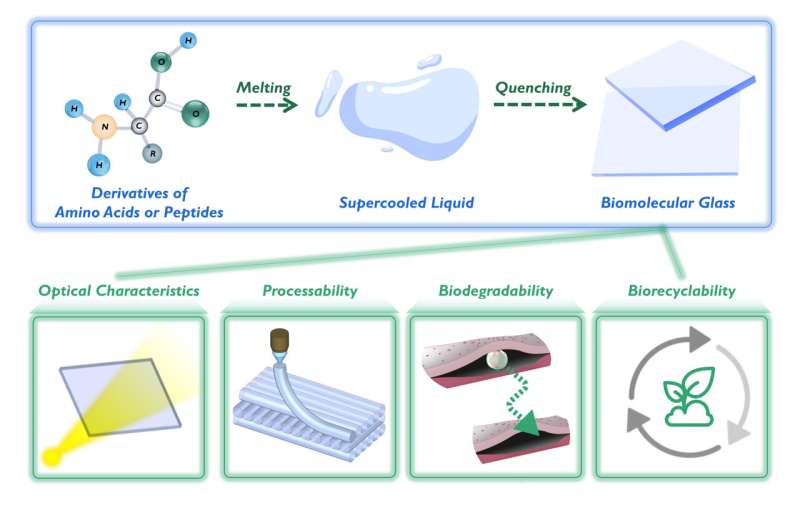Researchers develop biodegradable, biorecyclable glass

The widespread use of persistent, non-biodegradable glass that cannot be naturally eliminated causes long-term environmental hazards and social burdens.
To solve this problem, a research group led by Prof. Yan Xuehai from the Institute of Process Engineering (IPE) of the Chinese Academy of Sciences has developed a family of eco-friendly glass of biological origin fabricated from biologically derived amino acids or peptides. The proposed glass is biodegradable and biorecyclable.
This study was published in Science Advances.
Traditional glass, such as commercial inorganic glass and poly (methyl methacrylate) (PMMA) organic glass, etc., is biologically incompatible and not readily degraded in nature. The development of biodegradable and biorecyclable glass is expected to have a minimal environmental footprint.
Unfortunately, manufacturing such eco-friendly glass of biological origin is very challenging because biomolecules possess poor thermal stability and decompose easily at the high temperatures typically used in glass manufacturing.
In this study, the researchers used chemically modified amino acids and peptides to fabricate biomolecular glass with biodegradability and biorecyclability features through the classic “heating-quenching” procedure.
The researchers tracked the glass-forming ability, glass-transition-related kinetic and thermodynamic parameters of the material, as well as glass performance in vitro and in vivo.
Surprisingly, the biomolecular glass based on derivatives of amino acids or peptides showed a unique combination of functional properties and eco-friendly features, including excellent optical characteristics, good mechanical properties and flexible processability, as well as the desired biodegradability and biorecyclability.
“The concept of biomolecular glass, beyond the commercially-used glasses or plastics, may underlie a green-life technology for a sustainable future,” said Prof. Yan. “However, the biomolecular glass is currently in the laboratory stage, and far from large-scale commercialization.”
More information:
Ruirui Xing et al, Biomolecular Glass with Amino Acid and Peptide Nanoarchitectonics, Science Advances (2023). DOI: 10.1126/sciadv.add8105. www.science.org/doi/10.1126/sciadv.add8105
Citation:
Researchers develop biodegradable, biorecyclable glass (2023, March 17)
retrieved 17 March 2023
from https://phys.org/news/2023-03-biodegradable-biorecyclable-glass.html
This document is subject to copyright. Apart from any fair dealing for the purpose of private study or research, no
part may be reproduced without the written permission. The content is provided for information purposes only.
For all the latest Science News Click Here
For the latest news and updates, follow us on Google News.

